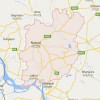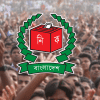EC passes the buck on society
The Election Commission has passed the buck to the society by making a ridiculous claim that "social instability is one of the major causes" for the widespread violence in the just concluded union parishad polls.
However, until making the claim on Saturday, its stance was different. It had been using canned words after each of the previous five phases of the polls. It kept claiming that the elections were free, fair and peaceful with the exception of some stray incidents.
On the previous occasions, the EC's claims never matched facts as widespread irregularities and violence were seen in all the phases.
The unbridled and alarming escalation in polls violence left at least 126 people killed since February, making the UP polls the deadliest in the history of Bangladesh.
After conclusion of the staggered polls on Saturday, the EC brought changes in its previous claims as Chief Election Commissioner Kazi Rakibuddin Ahmad cited "social instability" as one of the major causes for the poll violence.
With it, the EC tried to escape responsibility for its failure in ensuring free and fair polls by containing widespread irregularities and violence. It did not blame the police administration for deterioration of the situation.
The EC also did not criticise unruly behaviour of ruling party men who locked in fierce clashes among themselves in many UPs over capturing polling stations and stuffing ballot boxes.
The country's politicians in general are known for passing blame on each other and finding scapegoats.
But this time the EC, a constitutional body empowered with power to ensure free and fair elections, appeared to be a politician. By holding "social unrest" responsible for the election violence, it put the blame on the people who either were denied their voting rights or had become victims of the deadliest elections.
This claim is not justified as the facts tell a different story.
The last EC, led by ATM Shamsul Huda, held many elections including the 2008 parliamentary one in a free and fair manner.
Polls to upazila and union parishads, municipalities conducted by the last EC [between 2008 and 2011] were not marred by widespread violence and electoral irregularities.
Even elections to five city corporations conducted by the current EC in 2013 were largely fair and free from violence.
But the situation started to take a bad turn since the one-sided parliamentary election held on January 5, 2014.
Elections to upazila parishads, municipalities and three city corporations held afterwards were not free from electoral irregularities. However, there was no large scale violence.
So what happened in two years that changed the entire dynamic of the society?
The fact is the EC failed to deliver on its constitutional mandate to ensure free and fair elections. The constitution empowers it with power to take any necessary steps including cancellation of any election on grounds of irregularities for the sake of fair polls.
But the EC did not exert its constitutional power.
The government and the party in power cannot escape its responsibility for the controversial elections. There was a lack of political will on their parts to ensure free and fair elections. The city corporations polls in 2013 has proved that political will is a must for a free and fair polls.
The present EC formed in February 2012 is now in its last year of its five-year tenure. No major election is scheduled during the rest of its tenure. So, they will not have the scope to prove their efficiency and improve the image of the EC.
Kazi Rakibuddin and four other election commissioners were fortunate men. They took charge of an EC that was resting on a record of encouraging successes. The more important thing was that they could see people's overwhelming confidence in it.
It was ATM Shamsul Huda under whose leadership the EC had scaled new heights. He had got an EC which was mired in deep controversy for many controversial activities including more than 1.30 crore fake voters in the voter list.
People did not forget the EC led by Justice Aziz. Controversial activities of then CEC Justice Aziz and his team were also largely blamed for paving the way for the declaration of emergency in January 2007, suspending the scheduled parliamentary elections.
The EC led by Huda brought back people's confidence in it and they rose to the people's expectations. In such a situation, Kazi Rakibuddin and his colleagues took charge of the EC.
But in the last around four and half years, they could not deliver. When they retire after six months, they will leave behind the legacy of a damaged electoral system. They will be remembered for the wrong reasons.

 For all latest news, follow The Daily Star's Google News channel.
For all latest news, follow The Daily Star's Google News channel. 








Comments